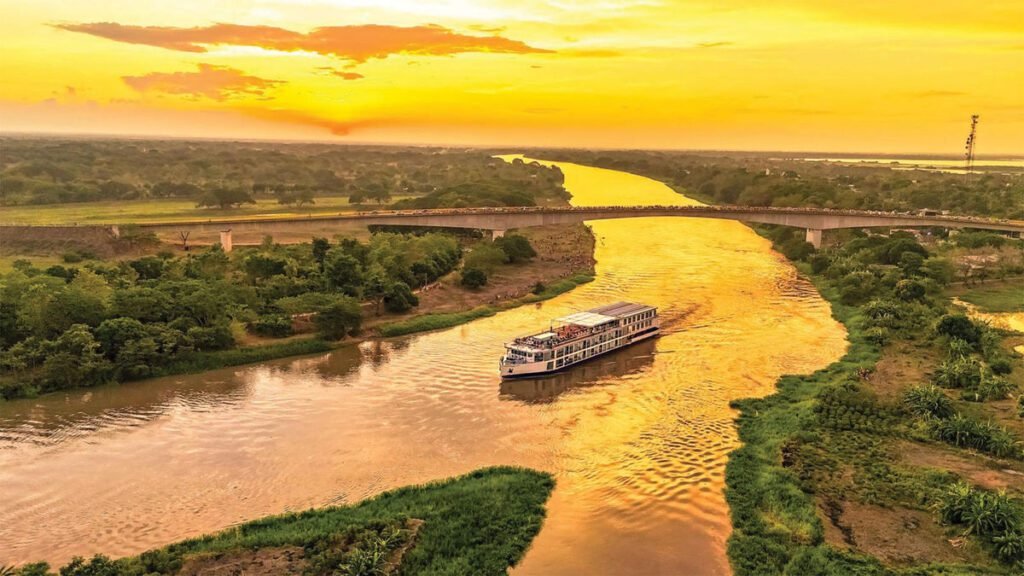After seven years of development, AmaWaterways has marked a significant milestone by launching the first overnight river cruises on Colombia’s Magdalena River in over five decades. On April 12, the 60-passenger AmaMagdalena began offering two seven-day itineraries that explore lesser-known communities along the river, places often overlooked by international tourists. AmaWaterways is set to introduce a second vessel later this September.
The journey to launch these river cruises faced numerous hurdles, including delays caused by the COVID-19 pandemic and local elections that necessitated a fresh approach. Despite these challenges, the Colombian government’s proactive measures to enhance the nation’s tourism image and support from entities like ProColombia, the country’s tourism agency, instilled confidence in AmaWaterways co-founders Rudi Schreiner and Kristin Karst that this was the right time to venture into the Colombian market.
Schreiner and Karst first considered the Magdalena River as a potential expansion point in 2018, recognizing its unique character. “There are lots of rivers, but very few where you see vibrant life along the banks, like the Magdalena,” said Schreiner. The two itineraries aim to showcase the colorful daily life in small villages while emphasizing the charm of lesser-known destinations.
The initial sailing of the AmaMagdalena navigated through the waters described by Colombian Nobel laureate Gabriel Garcia Marquez as the "river of life." ProColombia President Carmen Caballero stated that the launch signifies a transformative moment for Colombian tourism.
Industry professionals are optimistic about the venture’s potential to elevate Colombia’s profile as a luxury travel destination. Margoth Rico, a Colombian travel agency co-founder, acknowledged the significance of this launch for a nation that strives to shed its troubled past and attract international visitors seeking sophisticated travel experiences.
Jessica Riediger, a travel advisor with Vincent Vacations, noted increasing consumer interest in river cruises outside of traditional European routes. The introduction of the AmaMagdalena presents a solution for clients looking to experience luxury travel in Colombia, a market that has historically been challenging to promote.
Rico emphasized the importance of receiving recognition for Colombia as a prime destination for luxury tourism. Improved tourism infrastructure has been an ongoing focus for Colombia over the past two decades, with the introduction of river cruising poised to further elevate the nation’s appeal.
AmaWaterways aims to develop connections with small villages along the river. Karst has encountered enthusiastic support throughout the country, especially since the AmaMagdalena was constructed locally, creating a sense of community pride. Villages that gain exposure through these cruises are anticipated to experience economic growth as locals establish restaurants and train as guides.
Explorers can expect to visit historically rich towns like Mompox, known for its preserved architecture and heritage, and Palenque, a UNESCO World Heritage site recognized as the first free African town in the Americas. Both locations exemplify the unique off-the-beaten-path destinations the AmaMagdalena will incorporate into its itineraries.
The revival of tourism along the Magdalena River could significantly impact local economies, transforming small fishing communities into vibrant tourist destinations. The introduction of luxury river cruising not only highlights Colombia’s cultural richness but also positions the country as an emerging player in global tourism. As river cruises gain traction, expectations rise for other operators to enter the market, with predictions suggesting that within the next decade, up to 50 ships may be navigating the Magdalena.
This endeavor signifies a fresh chapter in Colombia’s tourism narrative, and as the country continues to enhance its offerings, both international visitors and local communities stand to benefit from increased engagement along this historic river.



